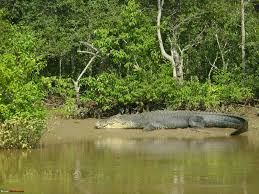Kendrapara: The recently conducted census has registered a fall in the number of crocodile nests this year in the famous Bhitarkanika National Park in Kendrapara district.
A total of 114 estuarine crocodile nests were spotted in four wildlife and forest ranges within Bhitarkanika National Park by the enumerators, Divisional Forest Officer (DFO) of Rajnagar Mangrove (Forest) and Wildlife Division, Sudarshan Gopinath Yadav, said Friday.
Last year, the Bhitarkanika National Park authority had spotted 122 nests of estuarine crocodiles in the Kanika, Gahirmatha, Mahakalapara, and Rajnagar wildlife and forest ranges under Bhitarkanika National Park, Yadav informed.
According to Yadav, the Forest personnel have spotted 102 crocodile nests in the Kanika Forest and Wildlife Range, 10 nests under the Rajnagar Forest and Wildlife Range, and one each at the Gahirmatha Forest and Wildlife Range and the Mahakalapara Forest and Wildlife Range.
Last year, the Forest personnel had spotted 107 nests of crocodiles in the Kanika Forest and Wildlife Range, 12 nests under the Rajnagar Forest and Wildlife Range, one crocodile nest in the Gahirmatha Forest and Wildlife Range, and two nests in the Mahakalapara Forest and Wildlife Range.
Generally, crocodiles tend to form nests in the same spot or nearby areas where they previously laid eggs as they are acquainted with the location.
Female crocodiles lay eggs inside the mangrove forest near the water bodies of the park and guard the eggs until the hatchlings emerge. During the nesting season, crocodiles lay eggs by creating mound-like nests with mangrove leaves. Hatchlings generally emerge from the nests after about 60 to 70 days.
As female crocodiles in Bhitarkanika National Park grow up to 14 feet, they can lay nearly 45 to 60 eggs. If a female crocodile grows longer than 14 feet, she is likely to lay more eggs, Forest officials said.
As many as 50 eggs from a wild nest were collected from the Kanika Forest and Wildlife Range to be incubated in captivity under semi-natural conditions at the Crocodile Breeding and Research Centre in Dangamal within Bhitarkanika National Park, the DFO said.
The 49-year-old captive albino, Gori, and the 21-year-old captive female albino, Mali, laid eggs a week ago in their nest and are now guarding the eggs, after a gap of three years, ACFin-charge of the Kanika Forest and Wildlife Range, Manas Kumar Das, said.
PNN
